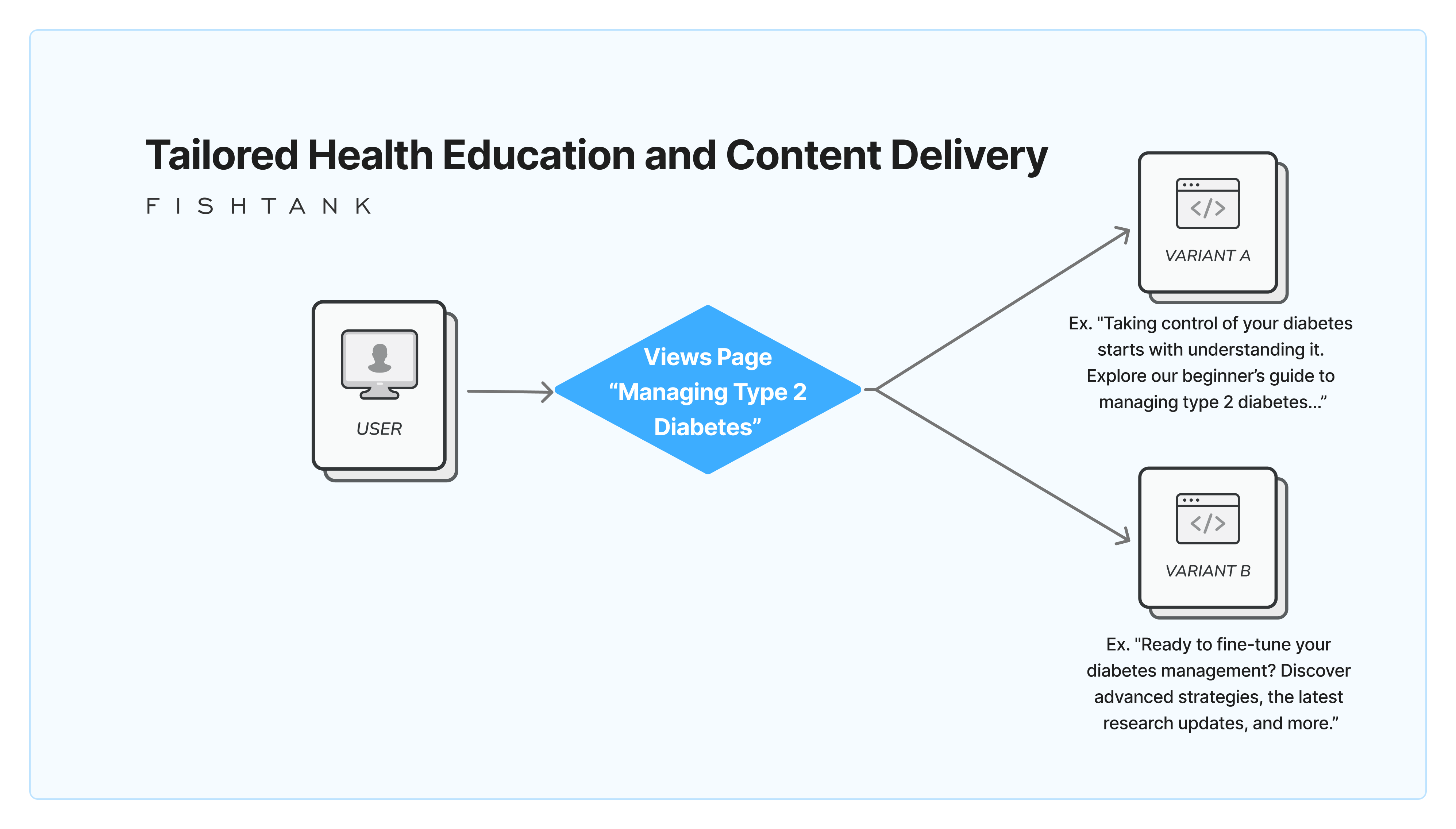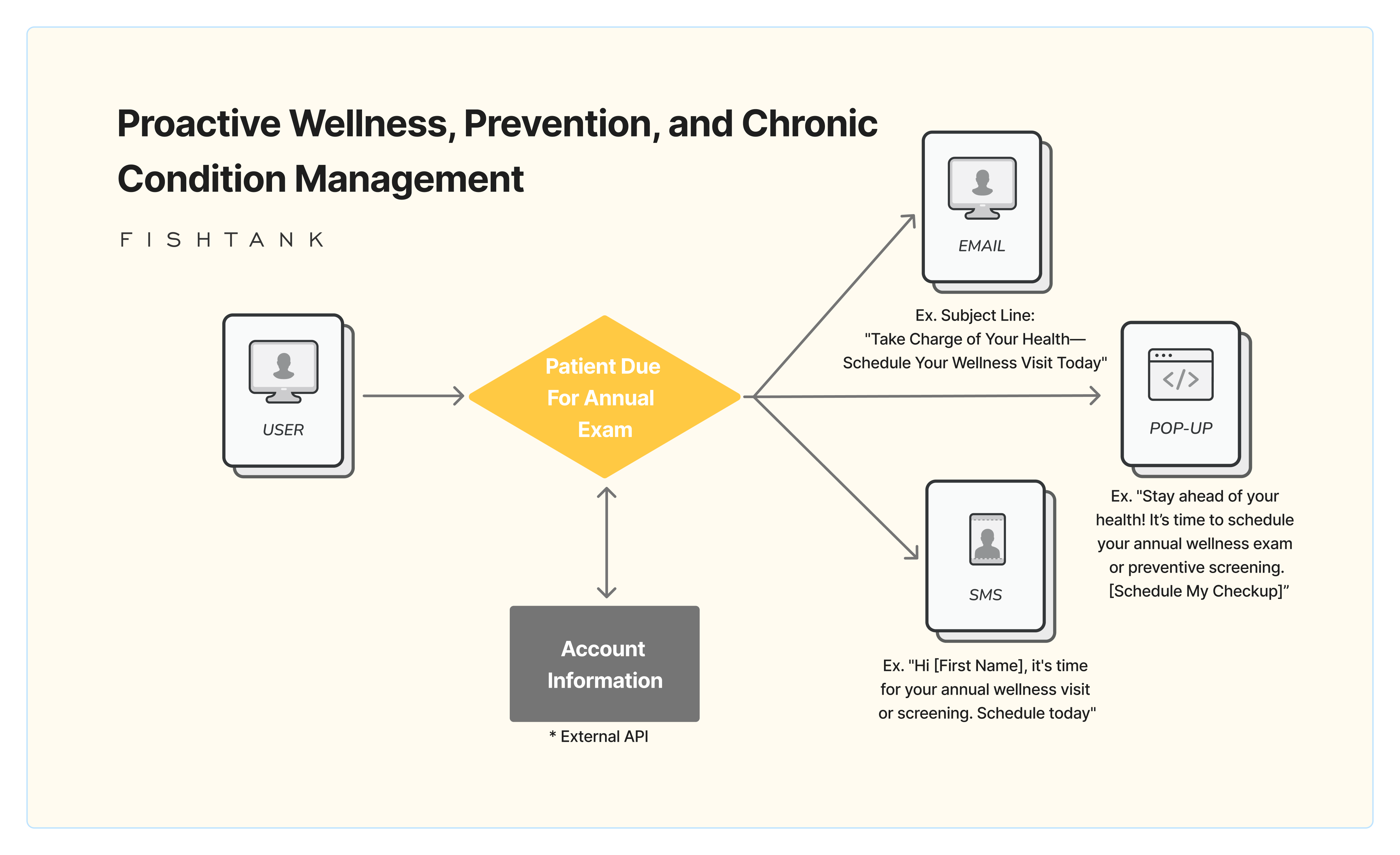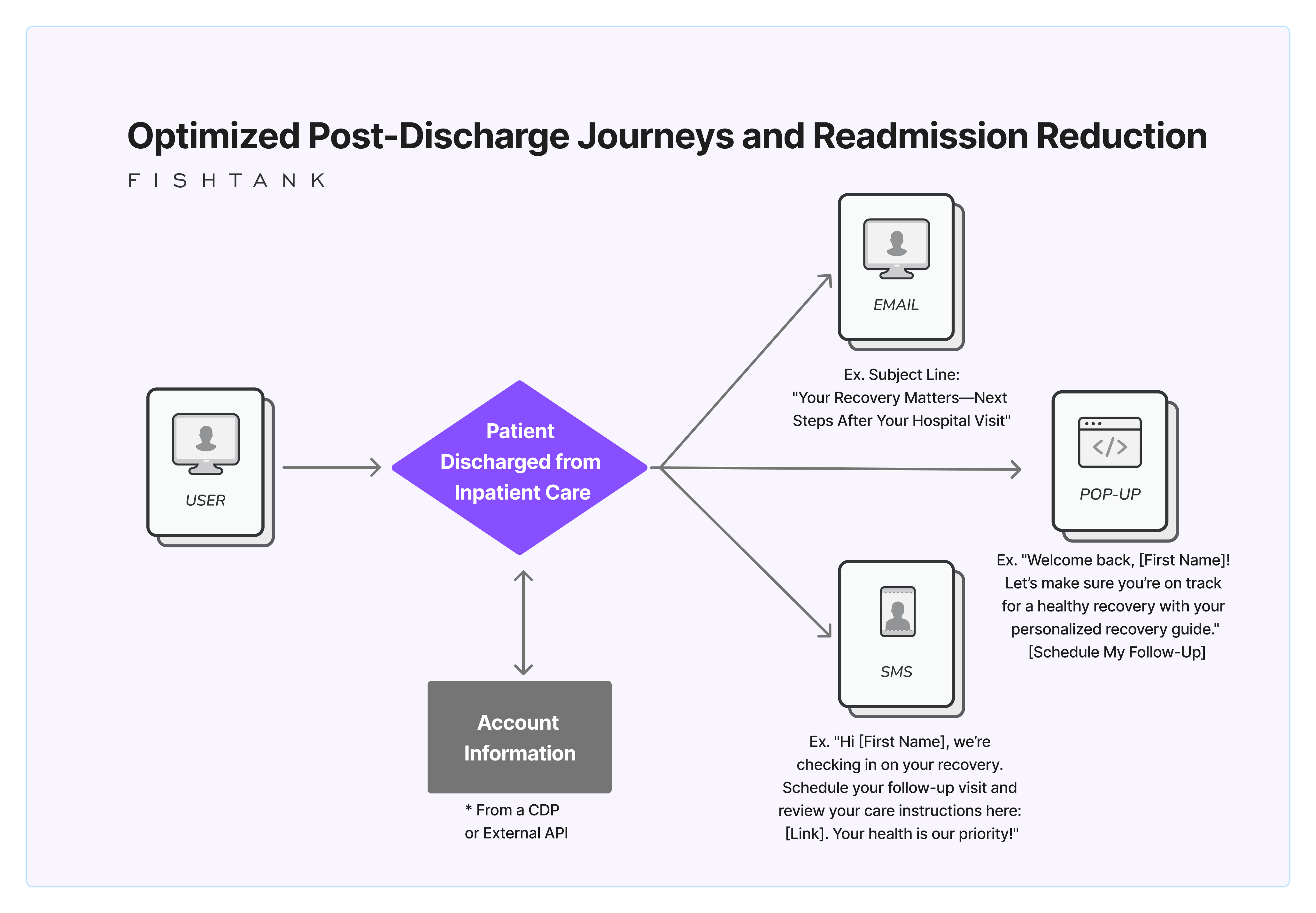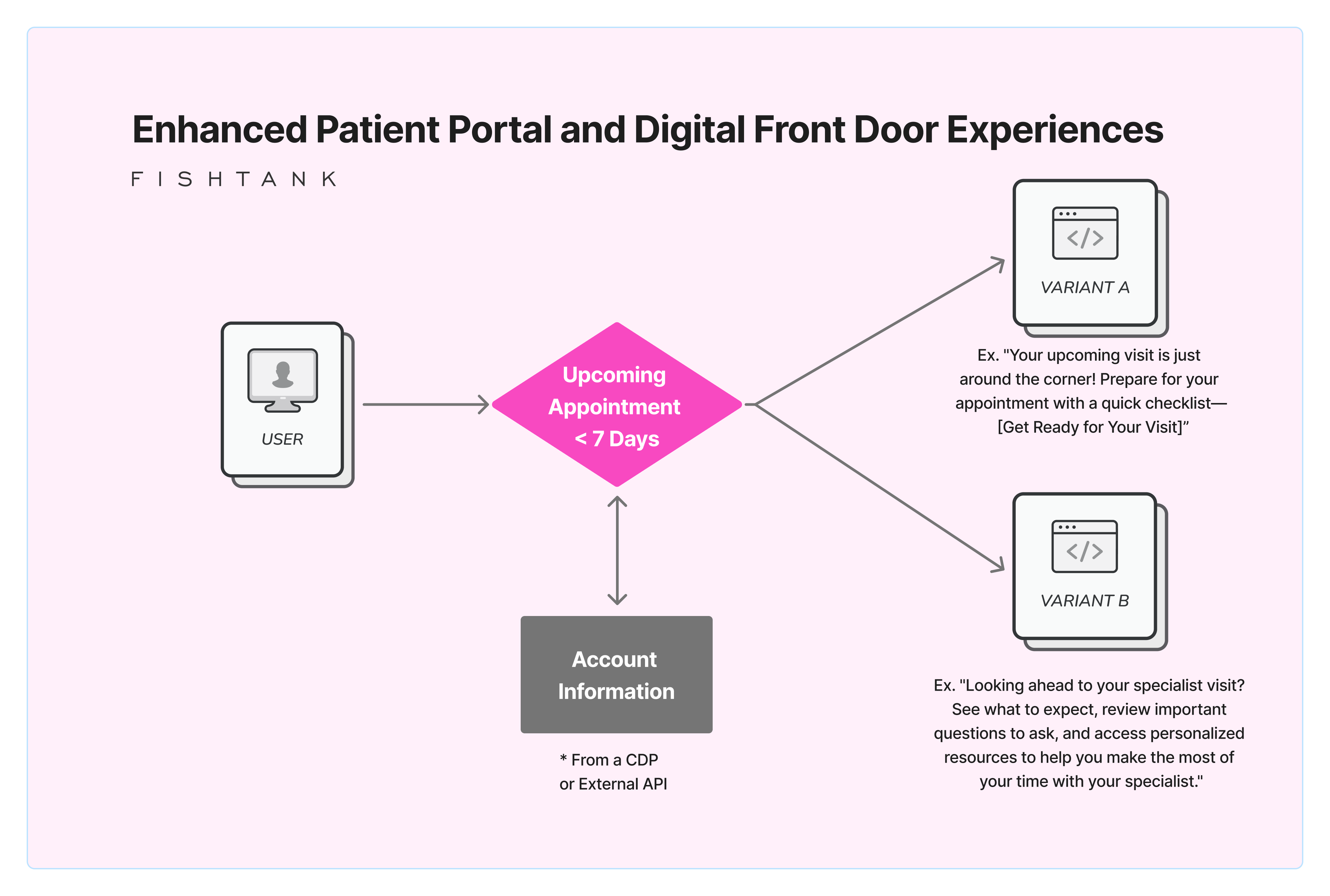The Power of Sitecore Personalization for the Healthcare Industry
Unlock the power of Sitecore Personalization to deliver patient-centered experiences, improve outcomes, and drive loyalty in today’s evolving healthcare landscape.
Unlock the power of Sitecore Personalization to deliver patient-centered experiences, improve outcomes, and drive loyalty in today’s evolving healthcare landscape.
Start typing to search...
Like many industries, the healthcare industry is undergoing a major shift—rising patient expectations, growing competition, new digital health technologies, and an urgent need for better care experiences. As patients become more familiar with personalized services in retail, finance, and entertainment, they now expect the same level of convenience, relevance, and proactive engagement from healthcare providers. Yet, many healthcare organizations still rely on generic messaging and standardized care journeys, missing opportunities to build trust, improve outcomes, and enhance patient loyalty.
This is where personalization comes in. By leveraging patient data, behavioral insights, and real-time engagement tools, healthcare organizations can deliver tailored communication, anticipate patient needs, and create supportive experiences across every touchpoint. From personalized health content to appointment reminders and care plan recommendations, providers that embrace personalization can build stronger relationships and drive better health outcomes.
In this blog, we'll dive into real-world examples of how healthcare organizations can use Sitecore personalization to transform the patient experience—and why it's a game-changer for the future of healthcare delivery.
When it comes to delivering personalized healthcare experiences at scale, Sitecore offers a suite of powerful personalization technologies. Depending on your organization's digital strategy and Sitecore setup, there are multiple ways to implement personalization, including:
Since this blog focuses on real-world healthcare examples and what's possible with Sitecore personalization, we won't dive into the technical differences between these solutions here. But if you want a detailed breakdown of how they compare and which one might be best for your organization, check out our (very) comprehensive guide on Sitecore Personalization Deep Dive: XP vs XM Cloud vs Personalize.
Now, let's explore how healthcare organizations can harness personalization to create meaningful, data-driven patient experiences.
Sitecore Personalize, Sitecore XP & Sitecore XM Cloud are built to handle Personally Identifiable Information (PII) securely, ensuring compliance with regulations like GDPR and CCPA.
Sitecore Personalize, a cloud-native platform, prioritizes privacy by enabling personalization with minimal PII, using anonymous identifiers like UUIDs for identity resolution. When PII is needed, it's processed securely via encrypted APIs, with configurable identity rules and real-time data processing to limit storage. Features like data portability, right to erasure, and opt-in/opt-out mechanisms further align with privacy laws, while analytics dashboards obscure PII for safe monitoring.
Similar features a necessary in Sitecore XP where data is stored in xConnect. Sitecore XM Cloud would leverage Sitecore Personalize to deliver personalized experiences using customer information.
The healthcare industry stands at a critical inflection point, facing escalating demands, mounting financial pressures, and the urgent need for digital transformation.1 Success in 2025 and beyond hinges on understanding shifting market demands, embracing technological innovation, and differentiating through superior patient experiences.2 Several interconnected trends underscore the growing necessity for personalization in healthcare, let's explore them now.
Healthcare has historically lagged behind industries like retail and finance in digital adoption, with many systems still reliant on outdated processes.1 However, this is rapidly changing. Accelerated digital transformation was cited as the top issue expected to impact global health systems in 2025, with 90% of C-suite executives anticipating increased use of digital technologies.1 Investments are growing in platforms for digital tools, core systems like EMRs, and emerging technologies such as AI, machine learning, and cloud computing.1 AI, in particular, is viewed by hospital executives as a major force that will reshape care delivery.2 This ongoing digital shift is not just about basic modernization—it builds the infrastructure for smarter, data-driven healthcare experiences, laying the foundation for personalized patient engagement.3
Today's healthcare consumers, especially younger generations, demand convenience, transparency, accessibility, and experiences personalized to their needs—expectations shaped by sectors like retail and finance.4 Seamless digital services like online appointment scheduling (essential for 80% of patients), instant access to health records, telehealth options, and clear communication about care costs have become baseline expectations.4 Yet gaps remain: 81% of consumers believe pharmaceutical companies should help facilitate care access, but only 16% feel those needs are prioritized.5 Furthermore, consumers increasingly feel less "cared for" by the healthcare system, eroding trust and loyalty.6 Online presence and reputation are now critical, with half of consumers trusting online reviews as much as personal recommendations.7 Meeting these heightened expectations is essential to retaining patients and building long-term trust.
Traditional healthcare communication often feels fragmented, inconsistent, and impersonal.8 Patients frequently struggle to navigate complex systems, with misunderstandings of discharge instructions contributing to 41% of unplanned care events.9 Although digital tools have become more widespread, disconnected systems create frustrating patient experiences.8 There's a strong need for true omnichannel engagement—where interactions across email, apps, web, and in-person touchpoints are seamless and personalized.2 Yet healthcare providers often face barriers in reaching patients effectively, with many executives preferring indirect methods of communication.2 Building trust is also critical: patients are nearly 300% more likely to recommend a healthcare organization they trust,7 yet growing concerns around data security and AI transparency mean organizations must be vigilant about how they engage.7
Financial pressures from inflation, labor shortages, changing reimbursement models, and policy shifts are squeezing healthcare organizations.10 Improving operational efficiency is a top priority for over 70% of C-suite executives.1 On the patient side, affordability is a significant barrier, with 28% of consumers skipping or delaying care due to cost concerns.8 Personalization offers a strategic path forward—helping organizations optimize resources, reduce redundant testing,11 promote preventative care to lower long-term expenses,4 and minimize costly readmissions through better post-discharge support.12 It also enhances administrative efficiency by delivering the right information to the right patient at the right time.13 Investing in personalized, consumer-facing digital experiences aligns with patient expectations and drives organizational value.4
The convergence of healthcare's push for digital transformation, rising consumer expectations for personalized care, ongoing communication challenges, and intensifying demands for value and efficiency makes personalization not just beneficial but essential. Platforms like Sitecore are uniquely positioned to help healthcare organizations navigate these challenges and deliver the seamless, trusted, patient-centered experiences that define the future of healthcare.
Personalization in healthcare isn't just about customizing content—it's about delivering support, fostering trust, improving outcomes, and helping patients navigate their health journeys more effectively. Using Sitecore's personalization tools, healthcare organizations can deliver the right information, at the right time, through the right channel. Here's how:

Patient Pain Point: Patients often receive overwhelming or generic health information that doesn't match their specific conditions, needs, or understanding level, leading to confusion and poor engagement.
Personalization Approach: Deliver highly targeted educational materials—like articles, videos, and infographics—based on a patient's demographics, conditions, and stage in their care journey.
How Sitecore Delivers It:
Expected Outcome:
Patient Pain Point: Patients often struggle to find the right provider, book appointments easily, or navigate available services, resulting in frustration and care delays.
Personalization Approach: Simplify the navigation and access experience by tailoring provider searches, appointment scheduling options, and location suggestions based on user profile data, preferences, and real-time behaviors.
How Sitecore Delivers It:
Expected Outcome:

Patient Pain Point: Preventative care and chronic condition management often feel reactive or disjointed, resulting in missed screenings, unmanaged risk factors, and worsening conditions.
Personalization Approach: Deliver proactive, personalized outreach campaigns promoting preventative screenings, vaccinations, and condition-specific support based on patient risk factors, medical history, and demographics.
How Sitecore Delivers It:
Expected Outcome:
Note: This proactive wellness and condition management personalization is conducted without using Personally Identifiable Information (PII) and only with patient opt-in. All targeting is based on consented data to ensure privacy and compliance.

Patient Pain Point: Discharge from the hospital often leaves patients confused or unsupported, contributing to unnecessary readmissions and poor recovery outcomes.
Personalization Approach: Create tailored discharge plans and proactive follow-up support personalized to the patient's condition, social needs, and recovery risk factors.
How Sitecore Delivers It:
Expected Outcome:

Patient Pain Point: Patient portals often feel static, generic, and disconnected from the rest of the patient's care journey, leading to low engagement and frustration.
Personalization Approach: Transform portals and websites into dynamic, user-centric hubs that display the most relevant information and services based on individual patient profiles and activity.
How Sitecore Delivers It:
Expected Outcome:
Personalization isn't just a digital upgrade—it's a strategic necessity for healthcare organizations striving to improve patient outcomes, elevate experiences, and streamline operations. By delivering tailored, data-driven experiences, healthcare providers can boost engagement, enhance loyalty, drive better clinical results, and improve operational efficiency. Here's how personalization makes a real impact in the healthcare sector:
Healthcare organizations that embrace Sitecore's personalization capabilities aren't just modernizing—they're redefining what it means to deliver exceptional care. The future of healthcare isn't about mass emails or generic patient portals; it's about delivering the right support, at the right time, through the right channel. Personalized, proactive, and truly patient-centered. Sounds powerful, right? Let's explore how to make it real.
The healthcare industry faces immense pressures—rising patient expectations, evolving care models, and the urgent need for digital transformation. Yet many healthcare organizations are still offering disconnected, one-size-fits-all experiences. Enter Sitecore personalization. With AI-driven insights and real-time patient data, providers can move beyond the generic—delivering tailored health education, personalized appointment navigation, proactive wellness outreach, post-discharge support, and dynamic digital front door experiences.
If you've made it to the bottom of this blog, congrats—you're serious about delivering better care. Fishtank can help you get there. We specialize in turning Sitecore personalization strategies into real-world success for healthcare organizations. From crafting patient journeys to implementing AI-driven personalization and optimizing every interaction, we'll help you transform engagement, improve outcomes, and future-proof your digital experience. Ready to lead the way? Let's talk.
Until then, happy personalizing!